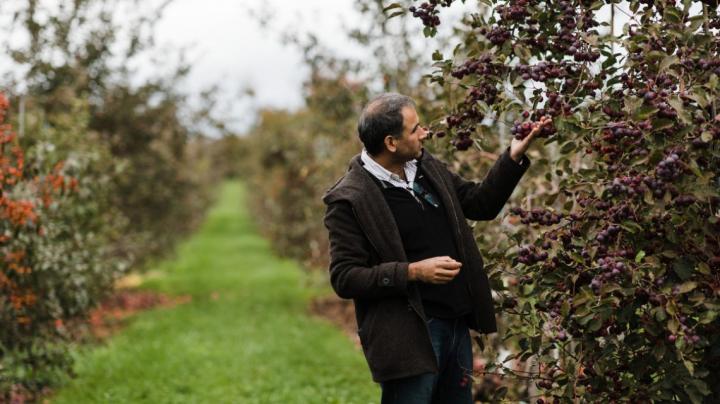
Credit: Allison Usavage, Cornell University
ITHACA, N.Y. – Since 2013, a mysterious phenomenon has been killing apple trees across North America, leaving growers panicked and scientists bewildered. The phenomenon has been named rapid apple decline (RAD) for its sudden onset, which causes apple trees to quickly deteriorate and die. Now, two Cornell University scientists are on a mission to track down its cause.
This effort is thanks to a recent $299,000 grant from the U.S. Department of Agriculture’s National Institute of Food and Agriculture. The three-year project, “Root Traits and Rapid Decline of Apple Trees in High-Density Orchards,” is one of the first federally funded projects to research rapid apple decline in the United States.
In Geneva, New York, two researchers at Cornell AgriTech first teamed up in 2018 to explore potential causes of RAD, such as pathogens, insects, cold weather injury and root systems’ interactions. While their findings revealed no direct above-ground causes, they noticed that a weaker root system could potentially contribute to the trees’ decline.
“So very little is known about the below-ground root system of apple rootstocks right now,” said Awais Khan, co-principal investigator and associate professor of plant pathology and plant-microbe biology. “By performing a comprehensive analysis of these systems, we are hopeful that this project will uncover the answers the apple industry has been looking for.”
He and Marc Fuchs, professor of plant pathology and plant-microbe biology, will hone in on the complex dynamics of apple root systems and explore the behavior of viruses in commercial apple orchards.
Khan and Fuchs will be working with commercial growers in the Hudson Valley, Capital District and Lake Ontario regions to compare physical samples of both declining and healthy trees from different orchards and soil systems. They will also obtain trees from nurseries in New York state and beyond for analysis.
As part of his research, Khan will explore a possible connection between high-density orchard systems and RAD.
Fuchs will establish whether the presence of viruses in these nursery trees may weaken the root system of declining trees.
Khan and Fuchs will also examine a wide variety of commonly used commercial apple rootstocks to determine whether there is a connection between RAD and specific rootstocks being used by growers.
“Ultimately, we want to help growers make good decisions about using cultivars that do not have viruses present on the right rootstock and in the right site,” Fuchs said.
###
Media Contact
Lindsey Hadlock
[email protected]
Original Source
https:/



